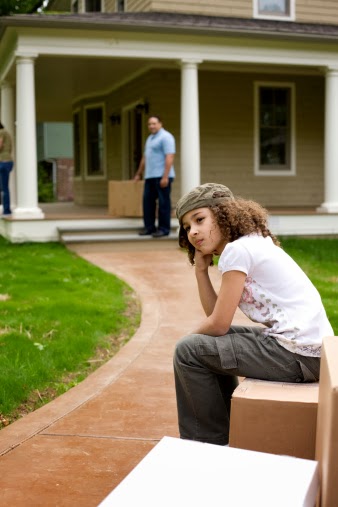 |
When finally deciding it's time to move, it’s important to tell
the family, especially the children, in a delicate manner. Don't wait or
hesitate to tell the kids about the move, they will need time to get used to
the idea and for it to sink in. It may take even more time to get the kids
excited about relocating to a new place, although some kids may never get
excited or look at the move in a positive way. Allow every member of the family
to participate in the move (e.g. choosing a new house together, planning and
packing items in your home together, help by putting boxes into the car or
moving van).
Stress for the entire family
Deciding to move house is a big stress-factor for the entire
family. But while adults tend to focus on the practical problems, a child will
focus on all the losses that the move causes. This can be the loss of their
friends or of a safe and familiar environment. Some children may not be
bothered by the move at all and may be very excited by it. Other children may
have a range of reactions depending largely on their age (start sucking their
thumb, wet the bed, talk baby talk, cling to you constantly, refuse to eat, suffer
insomnia, become shy or aggressive, change their sleeping patterns, have
trouble concentrating, have stomach aches or headaches).
Some children seem to change their personality and do things
they would have never done before. These reactions are stress reactions. Since
a child cannot always understand what is going on or express their own
complicated feelings, they show these sign of stress.
During a move the children need good, nourishing food and
enough rest and sleep. The child should have at least one adult who can spend
time with them and give them the opportunity to talk. During this difficult
period of transition, quality time with their parents is very important for a
child.
Moving with small children
Small children under five are the easiest to move. Their
sense of security depends entirely on their parents and they usually feel safe
provided their parents are around. Prepare young children for the move with
simple explanations, that you can repeat often. You could tell stories about
other children their age who are moving too.
When it's time to start packing, explain to the child that
their toys are just being put in boxes so they can be taken to their new home.
Otherwise, the child may worry that all their toys are about to disappear or be
taken away from them.
Do not make any promises that you cannot keep. For example,
don't promise that when you move the child can have a pet if that's not going
to happen.
Try not to buy a new bed or other furniture during this
period. New things create a feeling of insecurity.
If possible, it can be a good idea for the child to spend
moving day with friends or relatives, because their parents might be too busy
and they may feel left out.
Moving with school-age children
When you have school-age children you are concerned most
about whether they will like their new school and make new friends. Children
spend a lot of time in school so it is important that they like it.
When is the best time to move? During the school year or the
summer holidays?
If the change of school takes place over the summer, the child has more time to get used to the idea and has a fresh start with the rest of the children. But the child will then spend the summer without their old friends and without much opportunity to make new ones. If this is the case try and organise things so that the child is not bored or lonely.
If the change of school takes place over the summer, the child has more time to get used to the idea and has a fresh start with the rest of the children. But the child will then spend the summer without their old friends and without much opportunity to make new ones. If this is the case try and organise things so that the child is not bored or lonely.
Moving with teenagers
A teenager will usually understand why the family has to
move and what the consequences are. But a move may upset a teenager's life very
much. They will often lose their group of friends which is the most important
thing in their stage of life. They may be separated from a boyfriend or
girlfriend. It can be hard to start a new school at this age, when being
accepted by people of your own age group is so important.
The best way to help a teenager is to listen to them and
treat their concerns with respect. It is important to listen, understand and
above all, respect the teenager's feelings and wishes.
The degree of stress in moving is often underestimated by
all concerned. Research shows that moving house is one of the greatest stresses
we face in our lives. Of course planned and managed well, distress is not
necessarily the outcome.
Moving can be tough on kids. It's quite normal for children
to feel like they don't have any control and that they were never part of this big
decision. Because the decision to move is, after all, taken by the adults and
the child feels powerless because it cannot, and should not, influence that
decision.
Once all the packing and moving is completed, the kids need
to settle into the new space. For children and teens, this may be the hardest
adjustment they have to make. Saying goodbye to old friends was difficult, but
the excitement of moving to a new home, a new neighborhood can sometimes reduce
the initial anxiety they might feel. So to ensure your kids feel like they're
involved and part of this big life-changing event, there are some tips and
tricks.
When moving to a new area, finding a good school for your kids is very important. If you need help in finding information on schools in Whitby, Brooklin, Ajax, Pickering, Oshawa, Courtice or Bowmanville, contact me. I can make sure you get the information you need to make the best decision for you and your kids...
Randy Miller
Sales Representative
Re/Max Rouge River Realty Ltd., Brokerage
905-668-1800 or 905-427-1400
randy@randymiller.ca
www.randymiller.ca
Re/Max Rouge River Realty Ltd., Brokerage
905-668-1800 or 905-427-1400
randy@randymiller.ca
www.randymiller.ca


No comments:
Post a Comment